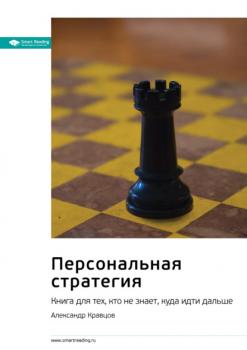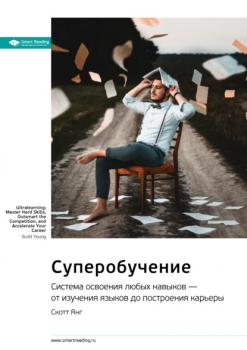Смарт Ридинг
Все книги издательства Смарт РидингКлючевые идеи книги: Искусственный интеллект для HR. Как использовать ИИ для поддержки и развития успешных сотрудников. Бен Юбенкс
Это саммари – сокращенная версия книги «Искусственный интеллект для HR. Как использовать ИИ для поддержки и развития успешных сотрудников» Бена Юбенкса. Только самые ценные мысли, идеи, кейсы, примеры. Искусственный интеллект – давно не техническая новинка: это компаньон, которому мы охотно доверяем решение самых разных проблем. Где-то ИИ дает нам подсказку, где-то и вовсе полностью заменяет человека. Один из самых важных вопросов: уничтожит ли ИИ рабочие места? Если да, то что делать миллионам безработных? Если нет, то что делать миллионам тех, чья работа никогда не будет прежней? Бен Юбенкс – мировой эксперт в области развития сотрудников. Он знает все про то, как нанимать и мотивировать лучших работников. И он смотрит на будущее с оптимизмом. Его книга – это переосмысление HR с точки зрения неизбежных перемен. Что может быть интереснее, чем взгляд на проблему квалифицированного и очень осведомленного оптимиста?
Ключевые идеи книги: Персональная стратегия. Книга для тех, кто не знает, куда идти дальше. Александр Кравцов
Это саммари – сокращенная версия книги «Персональная стратегия. Книга для тех, кто не знает, куда идти дальше» Александра Кравцова. Только самые ценные мысли, идеи, кейсы, примеры. В мире очень много талантливых, компетентных и амбициозных людей, но значимых успехов добиваются лишь единицы. И даже в этом случае их результаты несопоставимо малы по сравнению с их подлинным потенциалом. Эффективно поднять планку амбиций поможет эта книга. Вы узнаете, как проанализировать свое окружение, реально оценить возможности, отделить свои истинные цели от навязанных извне и выстроить долгосрочный вектор для развития.
Ключевые идеи книги: Облачная революция. Как конвергенция новых технологий вызовет следующий экономический бум и «ревущие 2020-е». Марк Миллс
Это саммари – сокращенная версия книги «Облачная революция. Как конвергенция новых технологий вызовет следующий экономический бум и "ревущие 2020-е"» Марка Миллса. Только самые ценные мысли, идеи, кейсы, примеры. Бывают эпохи, когда уже в начале десятилетия люди чувствуют: перемены, которые они наблюдают, в скором времени навсегда изменят их жизнь. Так было в 1920-е: радио, автомобили, авиация, кинематограф, телефон навсегда изменили работу промышленности, торговлю, рекламу, индустрию развлечений. Недаром то десятилетие назвали «ревущими двадцатыми». Крупнейший специалист по инновациям Марк Миллс убежден: в 2020-е нас ожидают столь же радикальные перемены. Ведь налицо повторение трех ключевых факторов перемен. Каких же? Будут ли эти перемены к лучшему? Какие символы будущего можно увидеть уже сегодня? И на что надеяться завтра? Ответы – в этом саммари.
Ключевые идеи книги: Суперобучение. Система освоения любых навыков – от изучения языков до построения карьеры. Скотт Янг
Это саммари – сокращенная версия книги «Суперобучение. Система освоения любых навыков – от изучения языков до построения карьеры» Скотта Янга. Только самые ценные мысли, идеи, кейсы, примеры. Скотт Янг мечтал стать предпринимателем. Он окончил школу и поступил в университет, чтобы изучать бизнес. Но в процессе обучения осознал, что программа направлена на подготовку «офисного планктона». Получив диплом, Скотт решил освоить перспективную профессию, связанную с IT. Но не был готов тратить еще 4–5 лет на освоение новой специальности и брать еще один образовательный кредит. Скотт все же получил диплом бакалавра компьютерных наук Массачусетского технологического института и стал программистом. Он потратил на обучение всего год, незначительную (по сравнению с полной стоимостью университетского курса) сумму и ни разу не посещал alma mater. А потом Скотт создал методику, которая помогает осваивать любые hard skills в сжатые сроки. Читайте саммари «Суперобучение», учитесь новому!
Summary: Amour – Amour – Amour. La puissance de l’acceptation. Lise Bourbeau
Notice: This is a SUMMARY of “Love, Love, Love. On the Different Ways to Improve Relationships and Accept Others and Yourself” by Lise Bourbeau. Lise Bourbeau is convinced that the key to resolving all life’s problems is acceptance and the ability to love unconditionally, both yourself and others. In her book Lise teaches us how to accept the choices made by our loved ones, our own weaknesses and those of others, fears and emotional wounds, as well as illness, aging and even death.
Summary: Amour – Amour – Amour. La puissance de l’acceptation. Lise Bourbeau
Notice: This is a SUMMARY of “Love, Love, Love. On the Different Ways to Improve Relationships and Accept Others and Yourself” by Lise Bourbeau. Lise Bourbeau is convinced that the key to resolving all life’s problems is acceptance and the ability to love unconditionally, both yourself and others. In her book Lise teaches us how to accept the choices made by our loved ones, our own weaknesses and those of others, fears and emotional wounds, as well as illness, aging and even death.
Summary: How to Live Mindfully with the Help of Meditation. Maria Gorina
Notice: This is a SUMMARY of “How to Live Mindfully with the Help of Meditation” by Maria Gorina. Have you ever tried peeling potatoes, devoting to this activity all your fullness and strength? Have you tried to play with your child the way children play: putting aside thoughts about work, forgetting about your phone and immersing yourself in the construction of a Lego castle? Have you tried listening to your partner, focusing on his or her words, emotions, voice, and not on your thoughts? Consciousness, or mindfulness, is the ability to be in the here and now, to experience the fullness of life. This skill not only makes us healthier, happier and more stress-resistant, it also gives us back our lives – those hours and minutes when we failed to live properly, when we were lost in our thoughts about who knows what. This article is a brief guide to mindfulness: using it to benefit your body, emotions and thoughts, as well as actions and relationships. Read it and live life to the fullest!
Summary: Chatter. The Voice in Our Head, Why It Matters, and How to Harness It. Ethan Kross
Notice: This is a SUMMARY of “Chatter. The Voice in Our Head, Why It Matters, and How to Harness It” by Ethan Cross. A Buddhist monk once said, “There’s a radio playing in our head, Radio Station NST: Non-Stop Thinking.” And this is definitely the case. It broadcasts every minute of every day and only stops working at night. And its content is mostly dramatic: every now and then thoughts pop up in our head about what we missed, what we didn’t say, or who was treated unfairly. The flow of thoughts in our head is tiring and annoying, but simply trying to turn off the radio will not work. “And it is not necessary,” psychologists say. Our inner voice is an evolutionary signal that helps us respond to reality. And you will be able to come to an agreement with your inner voice if you know how your consciousness works. Ethan Cross has been studying the nature of conscious thought control for many years and is now ready to offer a simple but effective system for neutralizing the chatterbox in our head.
Summary: When Things Fall Apart. Heart Advice for Difficult Times. Pema Chödrön
Notice: This is a SUMMARY of “When Things Fall Apart. Heart Advice for Difficult Times” by Pema Chödrön. In her book, When Things Fall Apart: Heart Advice for Difficult Times, Pema Chödrön gives practical everyday advice on dealing both with life’s great tragedies and minor announces. Borrowing from her studies under the tutelage of teachers and masters of Tibetan Busshism, Pema proposes that we take a closer look at the nature of suffering and reconsider how we relate to it. The methodology she proposes in her book will help us not only overcome pain, but also turn hell into medicine.
Summary: Peace Is Every Step. The Path of Mindfulness in Everyday Life. Thich Nhat Hanh
Notice: This is a SUMMARY of “Peace Is Every Step. The Path of Mindfulness in Everyday Life” by Thit Nhat Khan. Modern life is full of anxiety, stress, and bad news. Peace of mind is the most valuable currency. And somewhere in the mountains, Buddhist monks sit calmly in their poses, after having reached complete peace, without a care in the world.... Both scenarios are myths. Even in the hustle and bustle of everyday life, we can feel beauty in the world. Buddhists are by no means out-of-this-world thinkers, proof of which is provided by the example of the Vietnamese monk Thit Nhat Khan, who for many years preached in different countries and has fought for peace in his homeland. In his main book, he offers advice that will be of use to people no matter what age or religion. The Teaching of Tit Nat Khan’s work does not need to be translated into a simple, worldly language – it is already transparent, like water. The meditations he teaches do not require special conditions – they are as simple as breathing. Everything you wanted to know about harmony and happiness is in his wise lessons.









